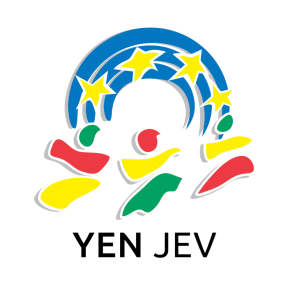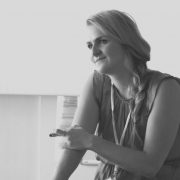Interview with Britta Tästensen, YEN President
European Youth Centre Strasbourg, 16 October 2017,
by European Youth Foundation (EYF), Council of Europe
Why are you here at the EYCS today ?
We are here for our last activity of our work plan 2017. The work plan is called “Building bridges” and this activity is called „Crossing Rivers”.
It is a bus tour through Central Europe, during which we will visit countries such as Denmark, Germany, Netherlands, Belgium, France, Switzerland, Italy and the Czech Republic.
What was the initial goal of your work plan ? One year later, can you say that you reached that goal?
The initial goal of the work plan was to strengthen our network but also to widen it by meeting new organisations, inviting more youngsters to our seminars, meeting other social groups and other minorities. That’s why we call the work plan “Building Bridges Together” because we wanted to strengthen the bridges we already have with our network but also build bridges with and towards other youth groups. The aim of this year was to look at our network and see how can we promote the topic of minorities within Europe but also how we can find new partners to support us throughout the year to reach our goals.
This year we especially dealt with the topic of how young people can build bridges of all kinds towards vulnerable groups, minorities, other countries and other societies. We believe that in building these bridges, we can create more tolerance amongst youth in Europe and thus avoid conflicts in the future.
Do you worry about the increase of extremism in Europe?
Definitely. It is the reason why we chose this topic as we can see there is a movement towards the right. How can we do something about it? By informing people how diversity can enrich a society and show its positive effects rather than the negative aspects. I personally find it very worrying that countries are looking more and more in the inside instead of outside. We have all to live together in this world, where apart from our own history we also share a common history and we cannot just say we will take care of ourselves and the other ones will take care of themselves.
Any ideas on how to respond to it?
The most important is to inform people as much as possible. I believe that the movement to the right is often because people are informed in the wrong way. They think that for example the refugees coming to their countries are a risk to their traditions and languages and so on. People are not informed enough and thus prejudices and exclusion evolve. They do not meet minorities or people who are different personally. They just hear about them from the media, higher bodies or somewhere else. We believe that if they meet them, if proper integration will be on top of the agenda, the risk of conflicts can be minimalized.
Have you any criticism to express concerning the EYF support?
It is very nice that the EYF is following our project. It is very motivating for the organisation to see that the EYF is really interested.
The daily programme is sometimes very difficult to write. We have to say one year in advance exactly what we want to do, at which hour on each day. That can be problematic because sometimes you have the concept, the aims, and you know exactly what you want to reach and also which workshops you want to provide, but to put everything on paper one year before is sometimes very complicated. Things can change and you have to report on the changes. We understand that the EYF needs to know which activities, workshops but an overall plan of each day would still give a good picture of the event. The final programme could be handed in later or as part of the report.



